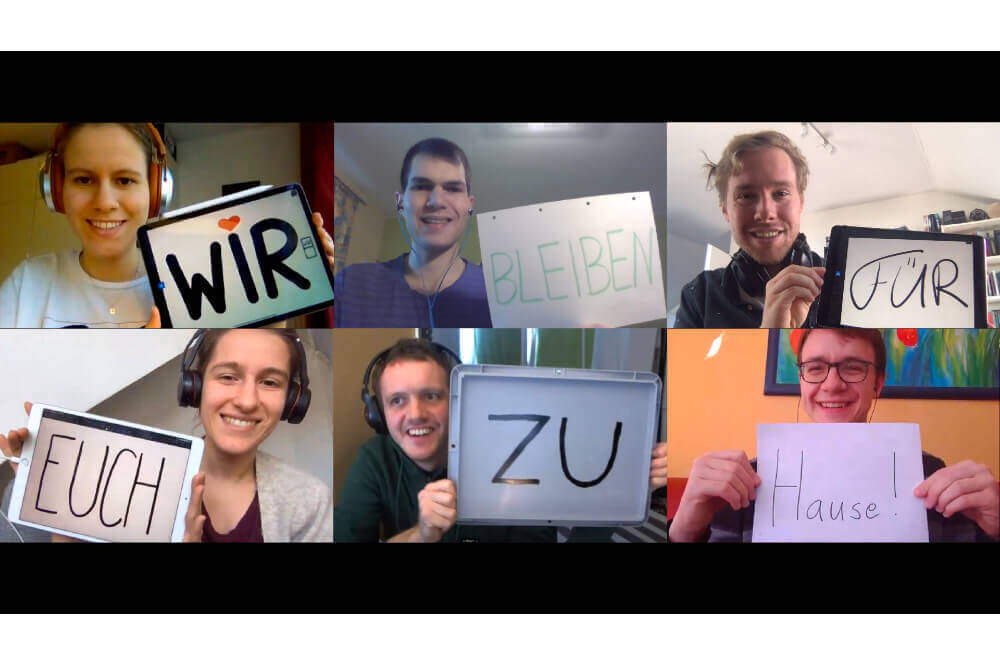Computer scientists develop new platform for telecommunication

The team of "Quokka": Sarah Sterz, Gregory Stock, Kevin Baum (top from left to right) Nora Muscholl, Florian Schießl and Maximilian Köhl (bottom from left to right) © Nora Muscholl
In times of the Covid 19 pandemic, experts all over the world agree that social distancing is the best way to slow down the spread of the virus. Many people who have been sent to their home office because of this recommendation for action are confronted with unexpected problems: Little things suddenly become complicated because the interaction with colleagues has become more cumbersome. On top of that, one gets bored and somehow feels a bit lonely. During the ” WirVsVirus“-Hackathon of the German government, computer scientists at Saarland University developed a software that is supposed make communicating with each other more accessible.
“As IT experts, it was easy for us to find a digital solution in the home office that allowed us to maintain our usual way of working and a certain sense of community,” says Maximilian Köhl, one of the developers of the new software. “We thought: ‚Everyone should be able to do this’ and therefore decided to develop a new easy access approach that everbody can use”
What the Saarbrücken computer scientists have come up with is called “Quokka”: the platform will allow users to communicate with each other as naturally as possible, even in times of contact prohibitions and movement limitations. For example, it will be possible to create a digital twin of those offices that are not allowed to be used at the moment. Users of the software are always online and can see who else is sitting in their virtual office. In the software, rooms are connected via corridors and corridors are in turn located in houses. “This structuring makes it possible to intuitively transfer the real world work environment into the digital space: If you want to ask a colleague something, you just go by his office. If you take a break, you go to the kitchen and maybe meet someone there for a quick chat,” explains Kevin Baum the idea behind the software. He is also a member of the development team. The new concept is intended to bring people closer together, structure everyday life and save unnecessary work by simplifying arrangements among colleagues and with superiors.
However, the developers also see possible uses for the software that go beyond the office environment. To work these use cases out, the developers have teamed up with experts from a wide range of fields, including teachers and data protection experts from the Saarland think-tank Algoright e.V. “In the field of e-learning, teachers could for example create their own classrooms to teach in, or open a teachers’ room that is only accessible to teaching staff. Families that are physically separated simply move together into a virtual house where they can talk to each other in an uncomplicated and lifelike way,” Baum says, explaining further usage examples.
“At the moment, our platform is the result of 48 hours of passionate work,” says Gregory Stock from the Quokka team, adding, “we’re still working on it and we have lots of ideas for additional features that will expand its capabilities.” Detailed information can be found on the software’s website, where the prototype can also be tested at any time. Quokka is open source and available on GitHub. Using the prototype is also completely free.
A team of six developers is behind the new platform. Most of them are employed at the computer science chair of Prof. Dr. Holger Hermanns at Saarland University: In addition to Maximilian Köhl, Gregory Stock and Kevin Baum, Sarah Sterz, Florian Schießl and Nora Muscholl, who is currently writing her master’s thesis at the German Research Center for Artificial Intelligence in Saarbrücken (DFKI), are involved in the development.
The six researchers inspired to develop this new application by the German government’s hackathon, “WirVsVirus”. The idea behind the event was to bring together as many IT-savvy and creative citizens as possible to develop digital solutions for dealing with the corona pandemic. There was great interest among the population: almost 43,000 people took part.
Questions can be directed at:
Kevin Baum
kevin.baum@uni-saarland.de
Further Information can be found at (both in german):
https://www.youtube.com/watch?v=d9Klhj9cWBw
Background Saarland Informatics Campus:
800 scientists and about 2000 students from 81 nations make the Saarland Informatics Campus (SIC) one of the leading locations for computer science in Germany and Europe. Five world-renowned research institutes, namely the German Research Center for Artificial Intelligence (DFKI), the Max Planck Institute for Computer Science, the Max Planck Institute for Software Systems, the Center for Bioinformatics and the Cluster for “Multimodal Computing and Interaction” as well as Saarland University with three departments and 18 degree programs cover the entire spectrum of computer science.
Editor:
Philipp Zapf-Schramm
Competence Center Computer Science
Saarland Informatics Campus
Phone: +49 681 302-70741
E-Mail: pzapf@mmci.uni-saarland.de

